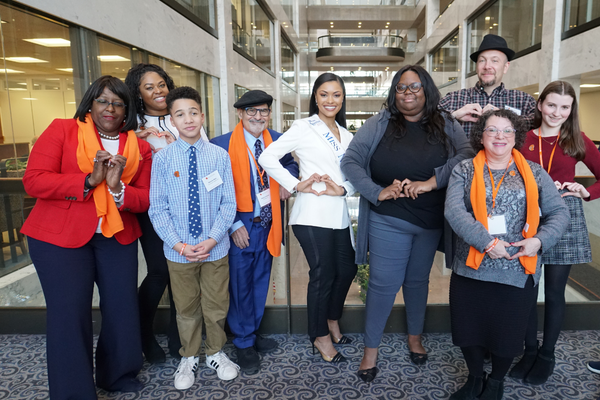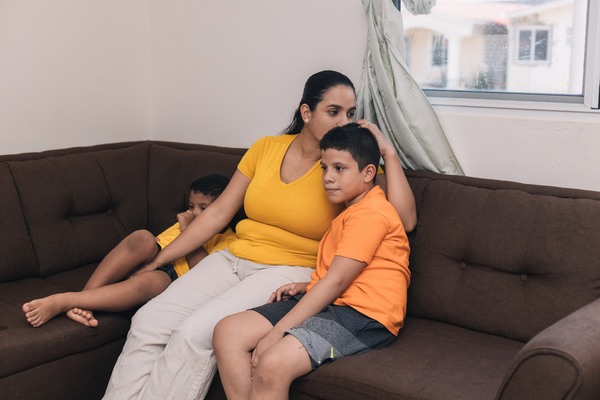February 21, 2023
Undocumented people face increased barriers to accessing health coverage and care, including treatment for kidney disease.
What advocacy is being done to improve access? Luz Baqueiro, a kidney transplant recipient with firsthand experience being denied care because of citizenship, and Dr. Lilia Cervantes, a first-generation Latina focused on promoting social justice in medical education and care, answer this question and more.
Luz Baquerio's kidney disease and advocacy journey
Luz was first diagnosed with kidney failure in March 2018.
"I initially went to the emergency room for extreme anemia. After I got a blood transfusion, my doctor told me my kidneys had failed," said Luz. "My mom and my brother were sitting next to me. I broke down crying because reality hit me–I had kidney failure and no health insurance."
Luz's mom, who doesn’t speak English, desperately asked what was wrong. Luz and her brother were too shocked to speak. As Luz's brother composed himself, doctors rushed Luz to surgery to get a catheter for dialysis.
"Everything was overwhelming. I'm a Deferred Action for Childhood Arrivals (DACA) holder. This is an administrative relief program that President Obama passed for childhood arrivals brought to the US by undocumented parents. It only protects us from deportation and provides us a work permit," said Luz. "Since I lived in Georgia, where there are no resources for undocumented immigrants with chronic conditions, I could only receive dialysis on an emergency basis."
Despite asking social workers for help, Luz could not receive government assistance because she was not a US citizen. For a year and a half, Luz could only receive dialysis when she was on the brink of death–around once a week–when she was suffering from fluid overload, high blood potassium, or other life-threatening consequences of kidney failure. This took a toll on her and her family’s mental health until she was able to purchase private insurance and finally received a kidney transplant towards the end of 2022.
"Having to come in when I was borderline dying really affected me and my family. I met so many other undocumented people in the emergency room who had similar stories. I decided something had to change," said Luz. "Now, I try to educate people on kidney disease and act as their advocate. I'll make calls for them and encourage them to purchase private insurance. I help people get enrolled on the kidney transplant waitlist, do small fundraisers, and I also joined NKF's advocacy group, Voices for Kidney Health."
See all the ways you can make a difference.
Dr. Lilia Cervantes' journey to advocacy
Dr. Lilia Cervantes has spent twelve years creating a diverse healthcare workforce and researching to improve person-centered and clinical outcomes for Hispanic/Latino people on dialysis. The catalyst for her interest in improving outcomes for Hispanic/Latino patients with all forms of chronic kidney disease came from working with an undocumented patient with kidney failure who struggled with emergency dialysis and ultimately died.
"Several patients came to our hospital once a week when they were at death's door for emergency dialysis," said Dr. Cervantes. "I became very close friends with one named Hilda because our lives were parallel in so many ways."
Dr. Cervantes and Hilda were of similar ages with two young children. Dr. Cervantes's parents also immigrated to the US just days before her birth.
"It was so unfair that she had to come to the hospital weekly near death and that her little boys had to see her that way. It broke my heart," said Dr. Cervantes. "She continued to get very sick, had three cardiac arrests, and developed other medical problems. Hilda knew that her days were numbered and decided to stop emergency dialysis. She wanted her boys to grow up without the anxiety that their mom might die, have an education, and be loved by a family that wasn't struggling."
Hilda worked with adoption agencies to find the right parents for her children, had one last big Christmas party, and went to Mexico to say goodbye to her family. Sadly, Hilda passed away on Mother's Day, 2014.
"Hilda motivated me to do something about this. I felt morally distressed going back to work after she passed away. I felt like something had to change," said Dr. Cervantes. "Meeting Hilda was a defining moment for me and I will forever be grateful for her."
Since then, Dr. Cervantes discovered that undocumented people who rely on emergency dialysis have worse outcomes. Using this research, Dr. Cervantes and others convinced Colorado Medicaid to include the diagnosis of kidney failure as a qualifying condition under Emergency Medicaid, thereby expanding access to standard dialysis.
"The second change started January 1st, 2022. Colorado started offering home dialysis to undocumented people through emergency Medicaid," said Dr. Cervantes. "We also passed a bill that expands the state Medicaid program to undocumented children under the age of 18 and undocumented persons for 12 months postpartum. Six other states have also changed access to care to standard dialysis for undocumented immigrants."
Have questions about accessing kidney disease treatments? Our Patient Information Center, NKF Cares, can help. We speak English and Spanish and are available Monday through Friday from 9:00 AM to 7:00 PM Eastern Time toll-free at 855.NKF.CARES (855.653.2273) or by email at nkfcares@kidney.org.
Become an advocate

While Luz and Dr. Cervantes have made incredible strides in improving kidney health in their states for undocumented people and patients who speak Spanish, there is still much work to do. You can help! Become a Voices for Kidney Health advocate to share your story and support significant changes to kidney health policy like the Health Equity and Accountability Act (HEAA) which addresses many long-standing issues in our healthcare system.
Get the latest in kidney research and treatment
Join us as we highlight the latest in kidney research, bring you up-to-date on kidney care, and answer questions from patients to help them live well with kidney disease or a transplant. Subscribe to Hot Topics in Kidney Health.


















